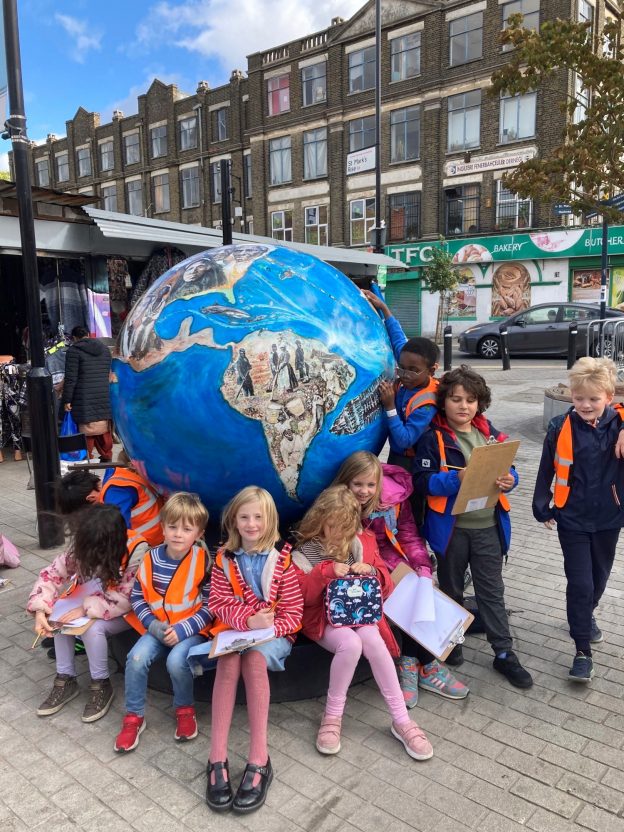Address:
William Patten Primary School
Stoke Newington Church Street
London N16 0NX
Office Manager: Rita Quigley
SENDCo: Caitlin Shaw
William Patten Primary School
Stoke Newington Church Street
London N16 0NX
Office Manager: Rita Quigley
SENDCo: Caitlin Shaw

Intent
At William Patten we believe that Geography helps to provoke and provide answers to questions about the natural and human aspects of the world. Children are encouraged to develop a greater understanding and knowledge of the world, its interconnectedness and their place in it. The geography curriculum at William Patten enables children to develop knowledge and skills that are transferable to other curriculum areas and which can and are used to promote their spiritual, moral, social and cultural development. Geography is, by nature, an investigative subject, which develops an understanding of concepts, knowledge and skills.
The curriculum is designed to ensure that teaching equips pupils with knowledge about diverse places, people, resources and natural and human environments, together with a deep understanding of the Earth’s key physical and human processes. As pupils progress through the school, their growing knowledge about the world helps them to deepen their understanding of the interaction between physical and human processes, and of the formation and use of landscapes and environments. Geographical knowledge and skills are progressive and are sequenced to provide the framework and approaches that provide explanation of how the Earth’s features at different scales are shaped, interconnected and change over time.
We seek to inspire in children a curiosity and fascination about the world and its people which will remain with them for the rest of their lives, equipping them well for further education and beyond.
Implementation
Geography at William Patten is taught in blocks throughout the year, so that children can achieve depth in their learning. Teachers have identified the key knowledge and skills of each blocked topic and these are mapped across the school, ensuring that knowledge builds progressively and that children develop skills systematically. Existing knowledge is checked at the beginning of each topic, as part of the KWL strategy (What I know, What I would like to Know and What I have Learned). This ensures that teaching is informed by the children’s starting points and that it takes account of pupil voice, incorporating children’s interests. Tasks are selected and designed to provide appropriate challenges to all learners and to develop independent working and confidence, in line with the school’s commitment to inclusion. At the end of each topic, children write a summary of what they know according to the key knowledge statements identified on the school’s progression map for geography (as worded on the TV Mat of the topic). Teachers support the children and scaffold this ‘knowledge summary’ as appropriate, according to the children’s age group as well as individual needs. This process is used to consolidate the key knowledge of the topic and each strand of knowledge included in the outcomes is ticked or highlighted.
Topic Vocabulary mats underpin children’s understanding of subject specific language, remind children of previous knowledge and provide visual and summative information on key knowledge to be learned. They support children in engaging in independent tasks. These are laminated and available as a reference point as needed. In addition, they are made available to parents to support learning at home.
Within all sequences of lessons, teachers plan a phase of progressive questioning which extends to and promotes the higher order thinking of all learners. Questions initially focus on the recall or retrieval of knowledge. Questions then extend to promote application of the knowledge in a new situation and are designed to promote analytical thinking, such as examining something specific. In geography, an example of this level of questioning might ask children to consider their own physical environment. Following map or globe work, they might be asked to consider differences or similarities between their environment and that of a country near the Equator. The questions that teachers ask within the same lesson phase, then focus on how life might be different in those zones, leading the children to draw conclusions about physical and human geography.
Cross curricular outcomes in geography are specifically planned for and these are indicated on the whole school Geography Knowledge and Skills Progression Map. The Geography provision is also well resourced and specific resources are mapped to specific year groups and topics to support effective teaching and learning. The local area is fully utilised to achieve the desired outcomes, with extensive opportunities for learning outside the classroom embedded in practice.
Impact
Outcomes in topic and literacy books, evidence a broad and balanced geography curriculum and demonstrate children’s acquisition of identified key knowledge relating to each of the identified national curriculum strands, as appropriate to key stage; locational knowledge, place knowledge and human and physical geography. This is in addition to the development and application of key skills, supported by fieldwork.
As children progress throughout the school, they develop a deep knowledge, understanding an appreciation of their local area and its place within the wider geographical context. Geographical understanding, as well as children’s spiritual, moral, social and cultural development is further supported by the school’s links with international partner schools and this is recognised by the school’s achievement of the British Council’s ‘International School Award’. This aspect of the work of the school is also supported through specific drives. These include ‘Language of the Month’, where children consider the origins of the languages spoken across the school, and ‘Tastes of the World’, in which they learn the origins of dishes prepared and contributed by the school community in a celebration of the school community’s cultural diversity. The children also capitalise on cross-curricular events, including Refugee Week lessons, which focusses on impact of migration to the UK.